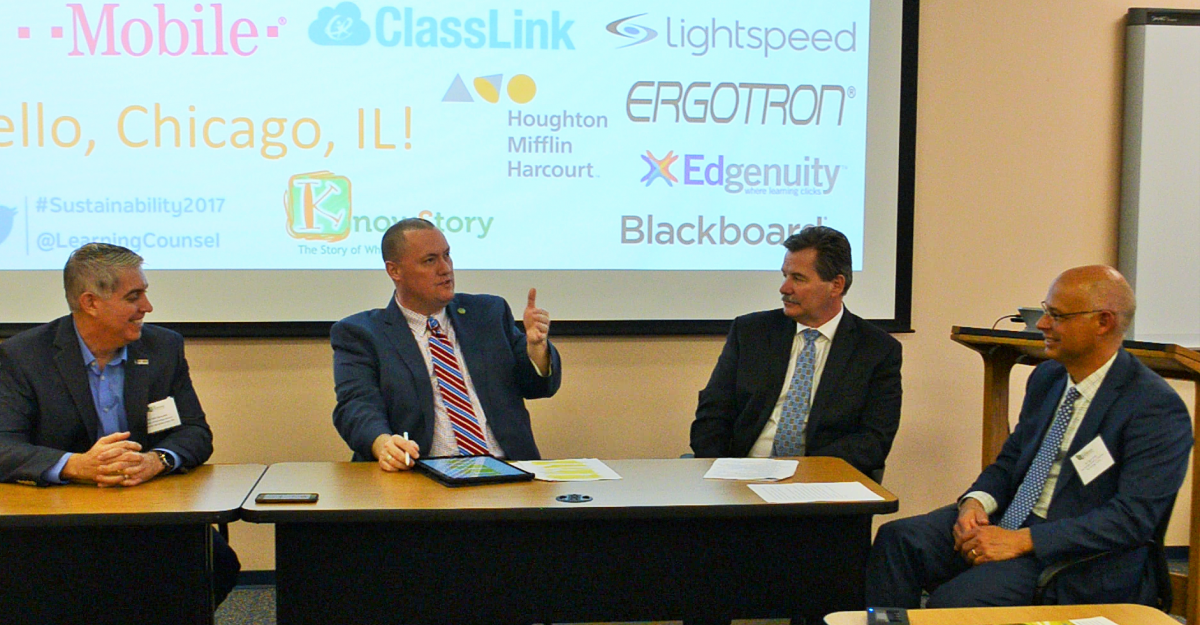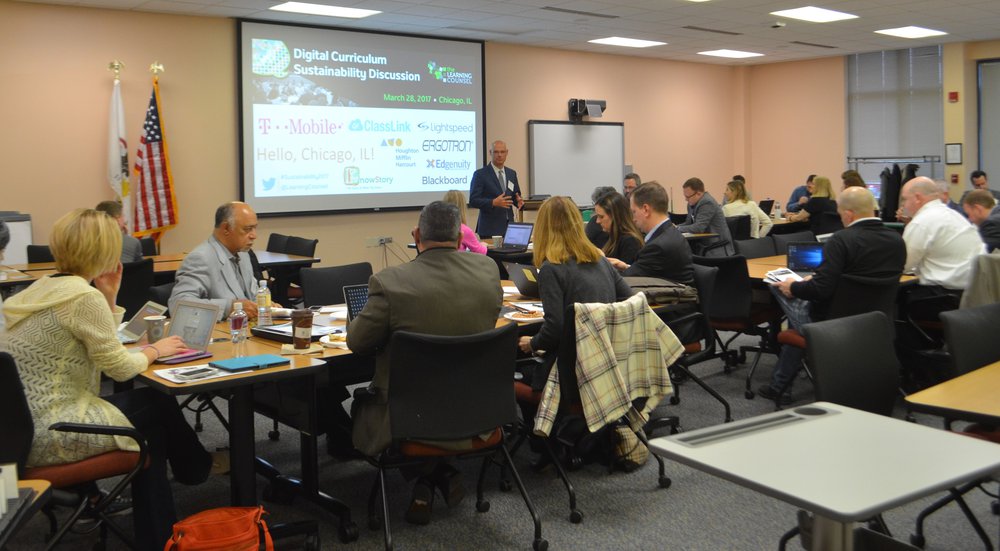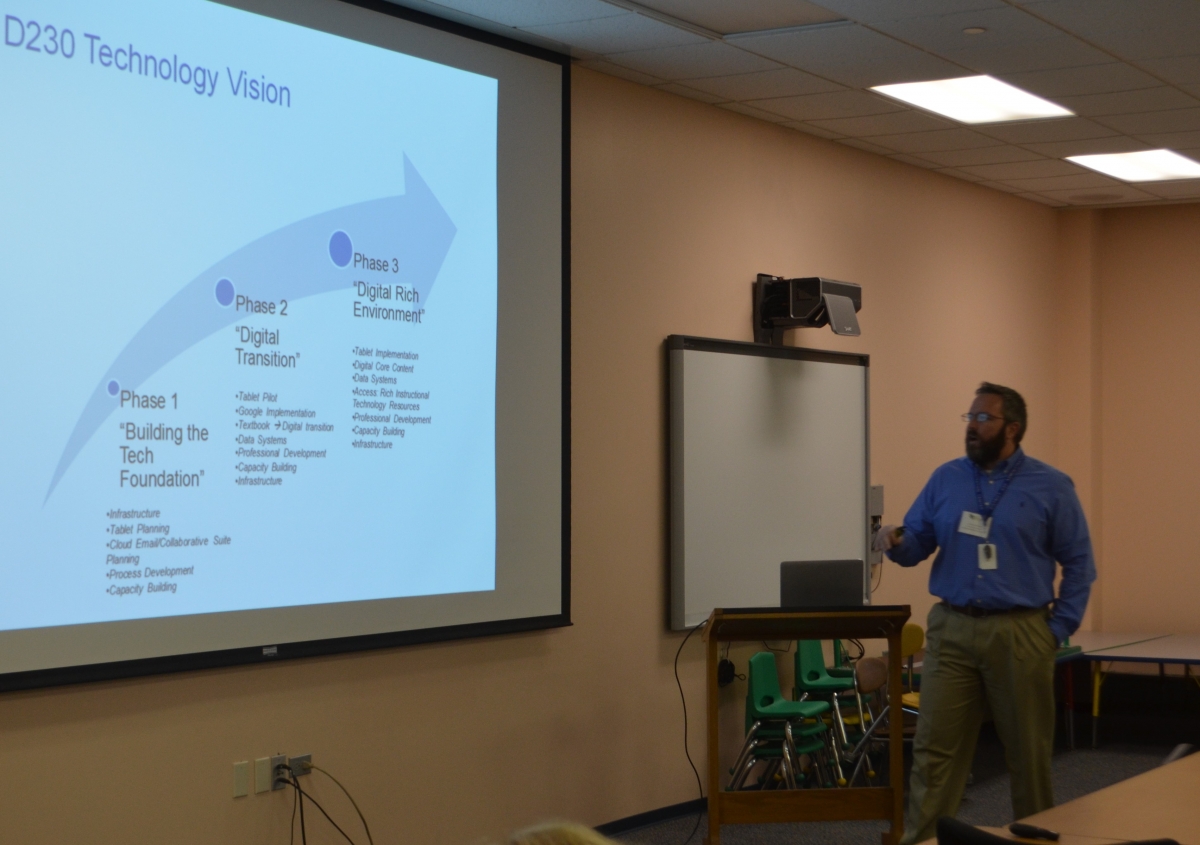Educators from across the Chicago region met at Orland Park School District 230 in late March to discuss technology change with the Learning Counsel, and consider ways to make tech shifts sustainable. Teams attended from Township High School District 214, Palos CCSD 118, Orland School District 135, Thornton Fractional HSD 215, Berwyn South School District 100, Community High School District 218, St. Barnabas, Wheaton Warrenville CUSD 200, State of Michigan Dept of Education, Kirby School District 140 and Lemont High School.
This was the twelfth city on the Digital Curriculum Sustainability Discussion tour of 2017 for the Learning Counsel. “It’s been a wonderful year of deep discussion of real issues, winning ways districts and schools are supporting new learning modalities and methods,” stated Dr. David Kafitz. “Here in the Chicago area these educators have been on this path of change for a while, they are trend setters and making great moves in support of teachers and the students.”
The Learning Counsel has been providing context and research to empower education leaders, to assist them, and their industry counterparts, to take next steps in education’s move towards fully personalized learning and shifting the way teaching is delivered. “Today as education leaders you have to make the choice to do what the board or other management bodies think is ‘acceptable’ or you launch off into an adventurous but vitally needed future,” stated LeiLani Cauthen, CEO of the Learning Counsel and author of the new book The Consumerization of Learning. “Today's students need personalized adaptive curriculum that thrills them and gives teachers the space to assist each child and guide them along their learning journey. Students should be able to learn calculus by the time they are 13 and be truly ready for the workforce of tomorrow before they leave high school.”
Related Video: School Survival and Love
Leilani spoke about pivoting the way teachers teach and the whole scheduling of things so that it centers on experiential learning, projects, great community and social-emotional interactions. “This pivot is the new competitive stance for schools,” she stated. Leilani then took all in attendance through the education transformation continuum and defined each stage, leading to the inevitable end-point of expo education.
With that, the day’s main agenda began and education speakers shared their stories, discussed the challenges they’ve faced and the successes along their path.
A Top Down Systems View
John Connolly, the Director of Technology for Consolidated High School District 230 in Orland, Illinois spoke about their tech transformation strategy. “Our phase one included building the tech foundation, infrastructure, tablet planning, cloud email/collaborative suite, processes and capacity building,” he stated. “Phase two was the digital transition, tablet pilot, Google suite, digital data systems and professional development. Phase three was building our digital rich environment, more professional development and core digital curriculum content.”
Connolly shared that at his district they used Skyward as an SIS and Edgenuity for credit recovery and some of the other operations and they use Canvas as their LMS, in addition to the Google suite. “Our issue now is how do we tie together all our contracts to renew at the same time? How do we streamline?”
“Considering the devices, we’re not a ‘one-device’ district. We have Chromebooks and iPads. What we’ve found,” stated Connolly, “is that the specific type of device isn’t the discussion. We’re planning for our students to end up having three devices per student on our networks because students bring their own phones, their iPads and maybe their watches.”
He spoke about the use of their Canvas LMS versus the Google suite. “Canvas has been awesome since it makes it so we aren’t totally confused about delivery. It’s easy to use, but people also really like Google and they want the quick solution. They are not diving into the more advanced features of Canvas and are more often going to ‘popular’ shared lessons on Google docs. We’re trying to figure out how to get teachers all using Canvas and discussing if we should force the issue that teachers must use the LMS system. It’s a challenge.”
Classroom Level Implementations
Jordan Garret is the Instructional Director for Berwyn South School District 100. She spoke mid-morning to share their tech implementation story. “We have about 4,000 students in 8 schools. In terms of funding we are in the bottom 25%. We are 73% low-income. We are crossing our fingers for a new referendum so we can do more things for kids in the future,” she stated. “We have started to look for alternative ways beyond a test score to prove effectiveness for learning achieved in the classroom. Our students take home their iPads about 350 days of the year, even over summer programs. We do have a very effective virtual summer school program, 75% of them show no summer slide.”
The executives at Berwyn knew that when devices were put in student’s and teacher’s hands they couldn’t expect things to just get magically better. “Being able to transform has taken years of planning, starting with visionary leadership,” stated Jordan. “We started in 2010 with a pilot 1-to-1 program and have grown from there.”
Ramona Towner leads the instructional coaching at Berwyn. She shared how they are addressing professional development to support tech implementation and empower their teachers. “My charge is to coach 5-7 teachers who can lead the other 300 teachers,” she stated. Their model includes 70 minutes of common planning time in their week so teachers could tackle, as a group, planning their instructional changes. “I am also head of social media, volume pricing manager for Apple apps, Google administrator and just generally help the district use tech instructionally.”
Jordan added, “We also have a club called iSwat. Each school has their own club for kids doing PD and they get to teach the teachers. We’ll even have kids lead staff meetings, helping them show off what they already know.”
Berwyn’s next step in transformation has been to work to create a flexible learning environment. “If you have a good student-centered classroom you can then open it up to more teaching/learning options,” stated Jordan.
Leadership Panel Discussion
A highlight of the day was the panel discussion with education executives from the Chicago region: Mr. Keith Bockwoldt, Director of Technology Services, Township High School District 214; Dr. DJ Skogsberg, Superintendent of Orland School District 135; and, Mr. James Gay, Superintendent of Consolidated High School District 230. Moderating was Dr. David Kafitz of the Learning Counsel.
“Currently we have 1-to-1 initiative for students in grades 3, 4 and 5 with iPads and grades 6, 7 and 8 with Macbook Airs,” stated Dr. DJ Skogsberg (second from the left). “A lot of what we’re doing as part of our transition, is attempting to have all of our schools become Apple Distinguished Schools with a vanguard group of teachers. That is a key sustainability piece and a way to be more cost effective.
“One of the things that we’ve started going through in this process is looking at ways to quantify and qualify, not only how instruction is being improved in the way of student engagement, but how technology is being embedded in the instructional process. We need to be able to show this to our Board. In addition to that, though, over the last six months, we’ve been looking at a shift to all iPads, grades 3 through 8, is it a bigger bang for the buck to do that if we can answer that it will have better instructional impact for the students.”
Dr. Skogsberg pointed out that they also considered the Chromebook option but it was thrown out. “Chromebooks immediately went out because of the amount of time and money that had already been dedicated to use Apple-based products as hardware even though we’re utilizing Google and Apple-based applications in the instructional process.”
Mr. Keith Bockwoldt (far left) spoke to what is hot in his district right now considering where they stand in the digital curriculum transition. “We are really looking at how to tap into the student’s curiosity and get them engaged with thinking and coming up with new ideas to offer businesses some value,” he stated. “The conversations right now at leadership levels is about where we are and how do we help our students be truly career ready for what the business world needs today.”
“Companies aren’t just looking for a student with a degree, they’re looking for a student that can bring value to them, as an organization.” He explained that they are working to decode that in this digital landscape that we’re in. “As education leaders we must help teachers to help their students explore their intellectual curiosity and be world-ready.”












